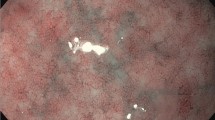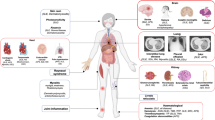Abstract
The role of a positive family history in pediatric inflammatory bowel disease (IBD) in the era of biologic therapy has not been elucidated. We retrospectively reviewed the medical records of children with IBD and retrieved demographic and clinical characteristics, including the presence of a positive family history of IBD, IBD phenotype, disease course, and therapy. Overall, 325 children (age range at diagnosis 11–15 years) were included, of whom 82 (25.2%) had a positive family history. Children diagnosed during 2016–2020 had a higher frequency of positive family history compared to those diagnosed during 2010–2015 (31.8% versus 20.7%, respectively, p = 0.024). Children with a positive family history had a higher risk for a stricturing phenotype than those with a negative family history (11.3% versus 2.8%, respectively, p = 0.052). They more often received nutritional therapy (53.7% versus 36.6%, p = 0.007) and less often received corticosteroids (36.6% versus 52.7%, p = 0.012). More children with a negative family history needed intensification of biologic therapy (p = 0.041).
Conclusion: The rate of a positive family history of IBD in the pediatric IBD population is increasing. A positive family history may have some impact upon IBD phenotype but none on IBD outcome.
What is Known: •Familial clustering of inflammatory bowel disease (IBD) has been reported in 5%-15% of IBD patients. •The investigation of the impact of a positive family history upon IBD characteristics and severity revealed conflicting results. | |
What is New: •In this cohort of 325 children with IBD, 25.2% had a positive family history. •The rate of a positive family history of IBD in the pediatric IBD population is increasing. •A positive family history may have some impact upon IBD phenotype but none on IBD outcome. |
Similar content being viewed by others
Abbreviations
- CD:
-
Crohn’s disease
- EEN:
-
Exclusive enteral nutrition
- ESPGHAN:
-
European Society for Pediatric Gastroenterology Hepatology and Nutrition
- IBD:
-
Inflammatory bowel disease
- IQR:
-
Interquartile range
- PCDAI:
-
Pediatric Crohn’s Disease Activity Index
- PUCAI:
-
Pediatric Ulcerative Colitis Activity Index
- UC:
-
Ulcerative colitis
References
Ordás I, Eckmann L, Talamini M, Baumgart DC, Sandborn WJ (2012) Ulcerative colitis. Lancet 380(9853):1606–1619
Baumgart DC, Sandborn WJ (2012) Crohn’s disease. The Lancet 380(9853):1590–1605
Halfvarson J, Bodin L, Tysk C, Lindberg EV, Järnerot G (2003) Inflammatory bowel disease in a Swedish twin cohort: a long-term follow-up of concordance and clinical characteristics. Gastroenterology 124(7):1767–1773
Stittrich AB, Ashworth J, Shi M, Robinson M, Mauldin D, Brunkow ME, Biswas S, Kim JM, Kwon KS, Jung JU, Galas D (2016) Genomic architecture of inflammatory bowel disease in five families with multiple affected individuals. Hum Genome Var 3(1):1–9
Halme L, Paavola-Sakki P, Turunen U, Lappalainen M, Farkkila M, Kontula K (2006) Family and twin studies in inflammatory bowel disease. World J Gastroenterol 12:3668–3672
Bernstein CN, Rawsthorne P, Cheang M, Blanchard JF (2006) A population-based case control study of potential risk factors for IBD. Am J Gastroenterol 101(5):993–1002
Orholm M, Munkholm P, Langholz E, Nielsen OH, Sørensen TI, Binder V (1991) Familial occurrence of inflammatory bowel disease. N Engl J Med 324:84–88
Strisciuglio C, Giugliano F, Martinelli M, Cenni S, Greco L, Staiano A, Miele E (2017) Impact of environmental and familial factors in a cohort of pediatric patients with inflammatory bowel disease. J Pediatr Gastroenterol Nutr 64(4):569–574
Brant SR (2011) Update on the heritability of inflammatory bowel disease: the importance of twin studies. Inflamm Bowel Dis 17:1–5
Henriksen M, Jahnsen J, Lygren I, Vatn MH, Moum B; IBSEN Study Group (2007) Are there any differences in phenotype or disease course between familial and sporadic cases of inflammatory bowel disease? Results of a population-based follow-up study. Am J Gastroenterol 102:1955–1963
Kuwahara E, Asakura K, Nishiwaki Y, Inoue N, Watanabe M, Hibi T, Takebayashi T (2012) Effects of family history on inflammatory bowel disease characteristics in Japanese patients. J Gastroenterol 47(9):961–968
Weinstein TA, Levine M, Pettei MJ, Gold DM, Kessler BH, Levine JJ (2003) Age and family history at presentation of pediatric inflammatory bowel disease. J Pediatr Gastroenterol Nutr 37(5):609–613
Roma ES, Panayiotou J, Pachoula J, Constantinidou C, Polyzos A, Zellos A, Lagona E, Mantzaris GJ, Syriopoulou VP (2010) Inflammatory bowel disease in children: the role of a positive family history. Eur J Gastroenterol Hepatol 22(6):710–715
Hwang SW, Kwak MS, Kim WS, Lee JM, Park SH, Lee HS, Yang DH, Kim KJ, Ye BD, Byeon JS, Myung SJ (2016) Influence of a positive family history on the clinical course of inflammatory bowel disease. J Crohns Colitis 10(9):1024–1032
Orlanski-Meyer E, Aardoom M, Ricciuto A, Navon D, Carman N, Aloi M, Bronsky J, Däbritz J, Dubinsky M, Hussey S, Lewindon P, Martin De Carpi J, Navas-López VM, Orsi M, Ruemmele FM, Russell RK, Veres G, Walters TD, Wilson DC, Kaiser T, de Ridder L, Griffiths A, Turner D (2021) Predicting outcomes in pediatric ulcerative colitis for management optimization: systematic review and consensus statements from the Pediatric Inflammatory Bowel Disease-Ahead Program. Gastroenterology 160(1):378–402
Borren NZ, Conway G, Garber JJ, Khalili H, Budree S, Mallick H, Yajnik V, Xavier RJ, Ananthakrishnan AN (2018) Differences in clinical course, genetics, and the microbiome between familial and sporadic inflammatory bowel diseases. J Crohns Colitis 12(5):525–531
Childers RE, Eluri S, Vazquez C, Weise RM, Bayless TM, Hutfless S (2014) Family history of inflammatory bowel disease among patients with ulcerative colitis: a systematic review and meta-analysis. J Crohns Colitis 8(11):1480–1497
Levine A, Koletzko S, Turner D, Escher JC, Cucchiara S, de Ridder L, Kolho KL, Veres G, Russell RK, Paerregaard A, Buderus S, Greer ML, Dias JA, Veereman-Wauters G, Lionetti P, Sladek M, Martin de Carpi J, Staiano A, Ruemmele FM, Wilson DC (2014) ESPGHAN revised porto criteria for the diagnosis of inflammatory bowel disease in children and adolescents. J Pediatr Gastroenterol Nutr 58:795–806
Levine A, Griffiths A, Markowitz J, Wilson DC, Turner D, Russell RK, Fell J, Ruemmele FM, Walters T, Sherlock M, Dubinsky M, Hyams JS (2011) Pediatric modification of the Montreal classification for inflammatory bowel disease: the Paris classification. Inflamm Bowel Dis 17:1314–1321
Turner D, Griffiths AM, Walters TD, Seah T, Markowitz J, Pfefferkorn M, Keljo D, Otley A, Leleiko NS, Mack D, Hyams J, Levine A (2010) Appraisal of the pediatric Crohn’s disease activity index on four prospectively collected datasets: recommended cutoff values and clinimetric properties. Am J Gastroenterol 105:2085–2092
Turner D, Otley AR, Mack D, Hyams J, de Bruijne J, Uusoue K, Walters TD, Zachos M, Mamula P, Beaton DE, Steinhart AH, Griffiths AM (2007) Development, validation, and evaluation of a pediatric ulcerative colitis activity index: a prospective multicenter study. Gastroenterology 133:423–432
Schiff ER, Frampton M, Semplici F, Bloom SL, McCartney SA, Vega R, Lovat LB, Wood E, Hart AL, Crespi D, Furman MA, Mann S, Murray CD, Segal AW, Levine AP (2018) A new look at familial risk of inflammatory bowel disease in the Ashkenazi Jewish population. Dig Dis Sci 63(11):3049–3057
Andreu M, Márquez L, Domènech E, Gisbert JP, García V, Marín-Jiménez I, Peñalva M, Gomollón F, Calvet X, Merino O, Garcia-Planella E, Vázquez-Romero N, Esteve M, Nos P, Gutiérrez A, Vera I, Cabriada JL, Martín MD, Cañas-Ventura A, Panés J (2014) Disease severity in familial cases of IBD. J Crohns Colitis 8(3):234–239
Wu J, Lubman DM, Kugathasan S, Denson LA, Hyams JS, Dubinsky MC, Griffiths AM, Baldassano RN, Noe JD, Rabizadeh S, Gulati AS, Rosh JR, Crandall WV, Higgins PDR, Stidham RW (2019) Serum protein biomarkers of fibrosis aid in risk stratification of future stricturing complications in pediatric Crohn’s disease. Am J Gastroenterol 114(5):777–785
Ben-Horin S, Avidan B, Yanai H, Lang A, Chowers Y, Bar-Meir S (2009) Familial clustering of Crohn’s disease in Israel: prevalence and association with disease severity. Inflamm Bowel Dis 15:171–175
Cohen S, Padlipsky J, Yerushalmy-Feler A (2020) Risk factors associated with extraintestinal manifestations in children with inflammatory bowel disease. Eur J Clin Nutr 74(5):691–697
Sahu P, Kedia S, Vuyyuru SK, Bajaj A, Markandey M, Singh N, Singh M, Kante B, Kumar P, Ranjan M, Sahni P, Panwar R, Sharma R, Das P, Makharia G, Travis SPL, Ahuja V (2021) Randomised clinical trial: exclusive enteral nutrition versus standard of care for acute severe ulcerative colitis. Aliment Pharm Ther 53:568–576
Shaoul R, Brown S, Day A (2018) Reasoning beyond the potential use of exclusive enteral nutrition and other specified diets in children with ulcerative colitis. J Pediatr Gastroenterol Nutr 66(3):378–382
Trier Moller F, Andersen V, Andersson M, Jess T (2015) Hospital admissions, biological therapy, and surgery in familial and sporadic cases of inflammatory bowel disease: a population-based cohort study 1977–2011. Inflamm Bowel Dis 20:2825–2832
Kelley-Quon LI, Jen HC, Ziring DA, Gupta N, Kirschner BS, Ferry GD, Cohen SA, Winter HS, Heyman MB, Gold BD, Shew SB (2012) Predictors of proctocolectomy in children with ulcerative colitis. J Pediatr Gastroenterol Nutr 55:534–540
Carbonnel F, Macaigne G, Beaugerie L, Gendre JP, Cosnes J (1999) Crohn’s disease severity in familial and sporadic cases. Gut 44:91–95
Author information
Authors and Affiliations
Contributions
AYF, MR, AS, and SC designed the study, contributed to the data used in the study, searched the literature, interpreted the data, and wrote the manuscript. AA, HML, ABT, YW, and AA contributed to the data used in this article and to the discussion and reviewed and edited the manuscript. All of the authors approved the final version.
Corresponding author
Ethics declarations
Ethics approval
This article does not contain any studies with human participants or animals performed by any of the authors.
Consent to participate
N/A
Consent for publication
N/A
Informed consent
N/A
Conflict of interest
The authors declare no competing interests.
Additional information
Communicated by Peter de Winter
Publisher's Note
Springer Nature remains neutral with regard to jurisdictional claims in published maps and institutional affiliations.
Rights and permissions
About this article
Cite this article
Ruban, M., Slavick, A., Amir, A. et al. Increasing rate of a positive family history of inflammatory bowel disease (IBD) in pediatric IBD patients. Eur J Pediatr 181, 745–751 (2022). https://doi.org/10.1007/s00431-021-04269-8
Received:
Revised:
Accepted:
Published:
Issue Date:
DOI: https://doi.org/10.1007/s00431-021-04269-8




